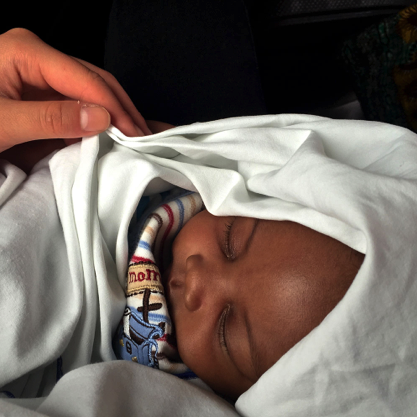Last week, a few of us went to the Volta region in central Ghana to document conditions at two local hospitals, the Ho Municipal Hospital and the Mater Ecclesiae Clinic. This is a story I wrote for the Public Agenda about the experience:
Although scorecards from hospitals such as the Ho Municipal Hospital and the Mater Ecclesiae Clinic show promising results in terms of improved facility access, staffing, and sanitation, staff members say coordination with outside organizations, such as the Alliance for Reproductive Health Rights (ARHR), could help bring more supplies and improve community outreach programs to increase awareness of societal health issues.
Two of the top five Millennium Development Goals for 2015 include reducing child mortality and improving maternal health, demonstrating Ghana’s strong need for programs like MamaYe!, a project sponsored by the ARHR through an organization called Global Action for Women Empowerment (GLOWA), that provides prenatal care and safe childbirth services to women of all socioeconomic levels.
GLOWA works with MamaYe! to “bridge the gap between pregnant women and health practitioners,” said GLOWA employee Wisdom Vurdzorgbe.
According to Vurdzorgbe, GLOWA, which has been in operation for about two years, hosts regular interface meetings in different regions to invite clients, local government officials, community members, and health practitioners to voice their concerns regarding specific reproductive health needs and shortcomings within the hospital systems.
The senior officer at Ho Municipal Hospital, Nancy Kattah, says, “We are working hand in hand” with MamaYe! to correct changes that need to be made to make the hospital the best it can be in prenatal and reproductive care.
“The hospital has maternal health at heart,” says Kattah.
However, according to the March 2015 MamaYe! scorecard, Ho Municipal Hospital only scored 79% on access to information and 51% on essential drugs, leading GLOWA and the ARHR to believe there is still room for improvement.
Vurdzorgbe said most facilities GLOWA works with lack equipment and other resources, so the organization tries to facilitate communication between government figures and health officials to create sufficient funds for the needs of the different hospitals.
Despite the shortcomings, many pregnant women and newborns benefit from the hospital’s communication with MamaYe!.
A patient at the Ho Municipal Hospital named Evelyn described the nurses in the birthing department as “very accommodating” and said she had been coming to the hospital for regular checkups to make sure she and her baby were healthy.
“You don’t know what is going on with the baby, so it’s important to catch abnormalities to make sure the babies stay safe,” said Vivian Kaledzi, one of Evelyn’s nurses, regarding the importance of prenatal care.
MamaYe! has helped the hospital disseminate information to expecting mothers about prenatal care and newborn health to ensure the safety of both the newborn and the mother, according to Vurdzorgbe.
Mater Ecclesiae Clinic, a clinic in the Volta region founded ten years ago by The Sisters of Mary Mother of the Church, similarly partners with GLOWA and uses the MamaYe! program to help ensure high health standards for mothers and newborns.
Sister Evelyn Claudia Afriyie, the head administrator of the clinic, claimed that transportation is among one of the most essential services to pregnant women. “Those in rural areas often don’t have money to get to clinics like ours,” says Sister Evelyn, so it is difficult for women to receive timely health care for themselves and their babies.
Thanks to the coordination between the clinic and community organizations such as GLOWA and the ARHR, the clinic recently obtained an ambulance that can help transport mothers, children, and others in need of emergency medical attention.
According to Elizabeth Amenyo, one of the midwives at Mater Ecclesiae Clinic, the clinic is planning to build a larger delivery site to make pregnant women more comfortable during labor. Although the management is unsure when development will occur, they agree that, with the help of outside organizations and funding, the clinic has the potential to provide easier access and wider health knowledge to those in need.
“Things are changing,” says Amenyo, “so we need others like MamaYe! to help us. But there have already been a lot of changes, improvements, since we started with MamaYe!.”
Prenatal care, childbirth, and child mortality are large issues facing Ghana in 2015, but programs like MamaYe! and organizations like the ARHR can help to form connections between health practitioners, government leaders, and community members to effect change in reproductive health issues.


